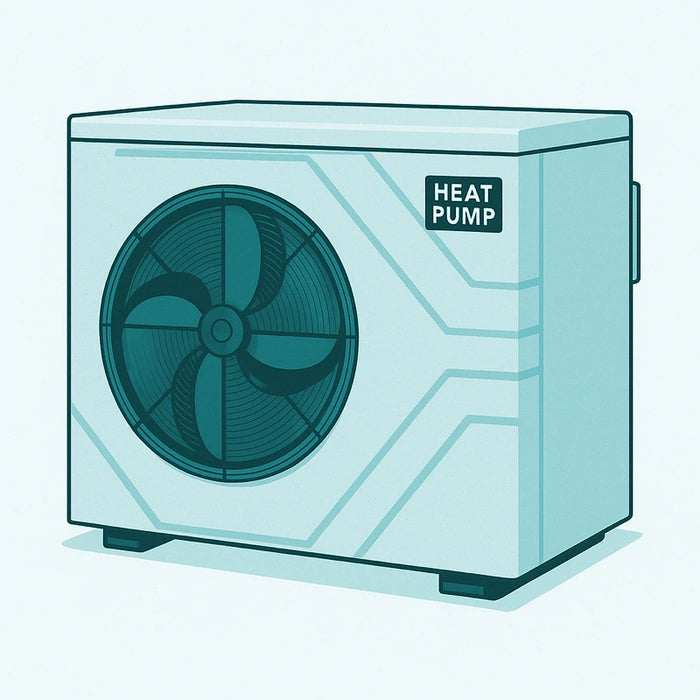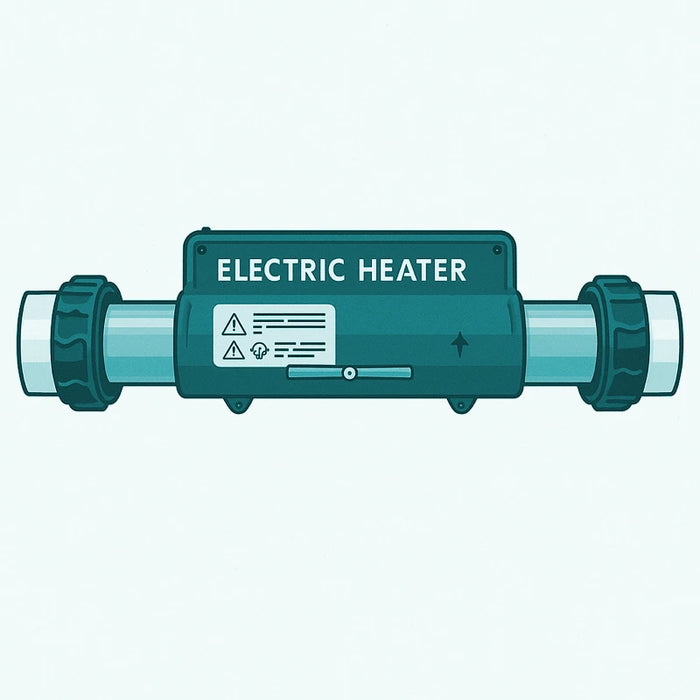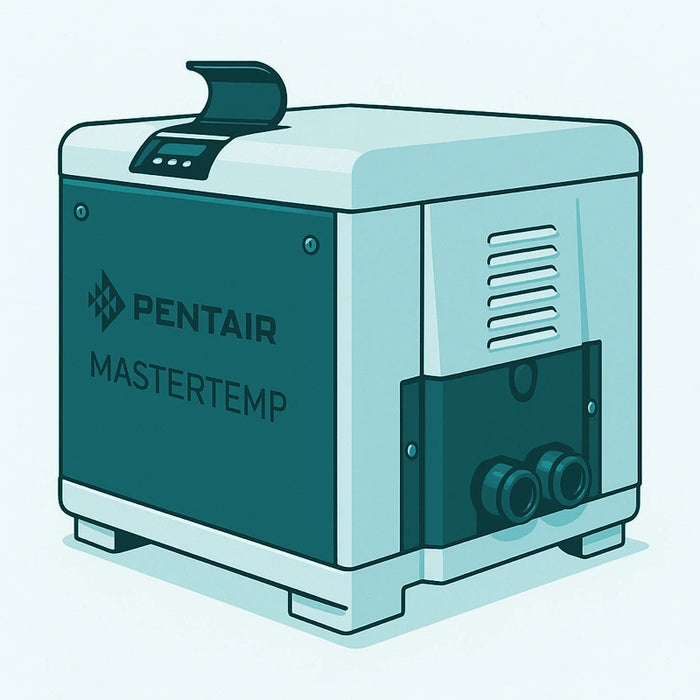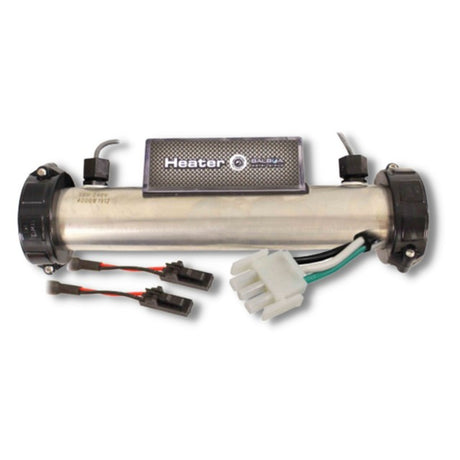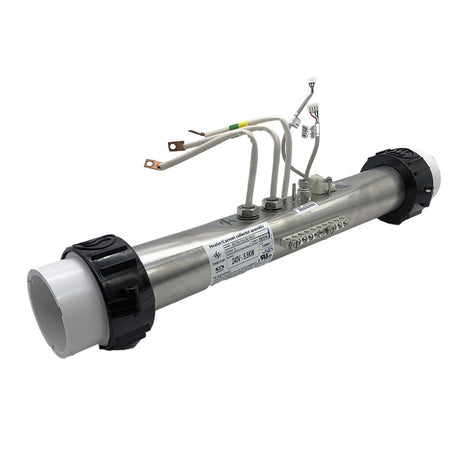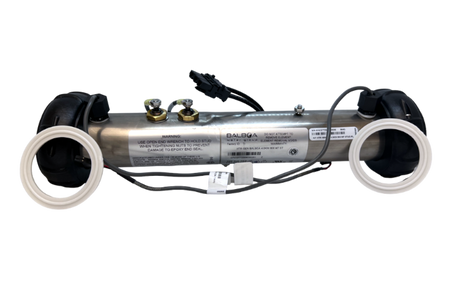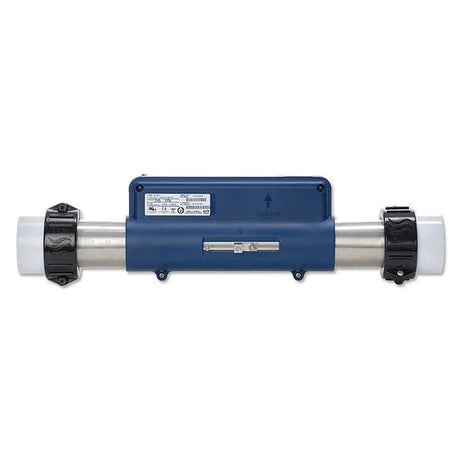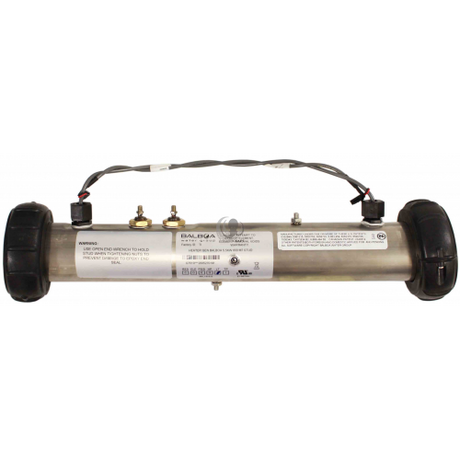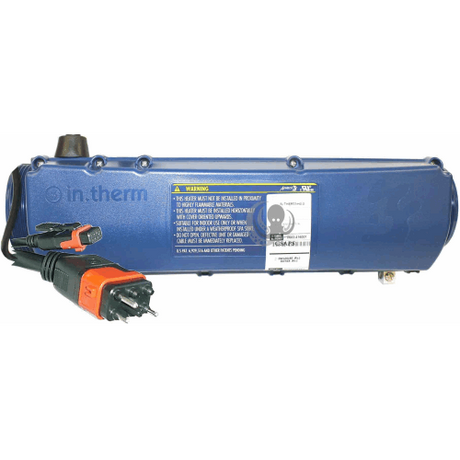Compare Hot Tub Heaters
-
![]()
Heat Pump Spa Heaters
Heat pumps use the surrounding air to heat your spa water, making them up to 3x more energy-efficient than standard electric heaters. They take longer to heat up but are a great choice if you want to save money on energy bills.
Heating Speed: Slowest
Energy Efficiency: Maximum
Cost Level: Higher upfront, lower long-term costs
Best For: Homeowners wanting to save on energy bills.
-
![]()
Electric Spa Heaters
The most common option, electric heaters are reliable, affordable, and easy to install. They heat water directly using an electric element and work with most spa control systems. Ideal for homeowners looking for simple, dependable performance.
Heating Speed: Moderate
Energy Efficiency: Standard
Cost Level: Affordable
Best For: Owners looking for simple, reliable heating.
-
![]()
Gas Spa Heaters
Gas heaters are the fastest way to warm up your spa, making them popular for large hot tubs, vacation rentals, or heavy use. They’re more costly to install but perfect if you want quick, powerful heating on demand.
Heating Speed: Fastest
Energy Efficiency: Moderate
Cost Level: Higher install + fuel cost
Best For: Large spas or frequent use when quick heat is needed.

BRAND HIGHLIGHTS
Balboa Water Group
Balboa is one of the most recognized names in the spa industry. Known for their advanced spa control systems and durable M7 heating technology, Balboa heaters offer precision, built-in safety, and Wi-Fi ready options for modern convenience.

BRAND HIGHLIGHTS
Gecko Alliance
A Canadian brand, Gecko specializes in user-friendly spa controls and heaters designed for reliability in tough climates. Their heaters are compact, efficient, and easy to integrate with existing spa systems, making them a favorite among DIY hot tub owners.

BRAND HIGHLIGHTS
Hydro-Quip
Hydro-Quip specializes in custom spa packs and heaters, offering flexible solutions for both new installations and retrofits. With a reputation for easy servicing and versatile designs, Hydro-Quip is a great choice for spa owners needing replacements or upgrades.

BRAND HIGHLIGHTS
Marquis Spas
Marquis combines luxury and performance in their hot tub systems, and their heaters are no exception. Known for high-quality craftsmanship and attention to detail, Marquis heaters are built into spas designed for premium comfort and long-lasting enjoyment.
K&J Leisure Product Spotlight
Frequently Asked Questions: All About Hot Tub Heaters
Why isn’t my hot tub heating up?
Why isn’t my hot tub heating up?
If your hot tub isn’t heating, check for proper water flow, ensure the filter isn’t clogged, and verify that your heater is receiving power.
Sometimes the issue is a tripped breaker, low water level, or a faulty sensor. If those check out, the heater element or control pack may need replacing.
How long does it take to heat a hot tub?
How long does it take to heat a hot tub?
On average, an electric heater takes 8–12 hours to heat a standard spa, while a gas heater can warm water in 4–6 hours.Heat pumps are slower but far more energy-efficient, making them ideal for long-term savings. Wood-fired heaters depend on fire strength and conditions but can heat a smaller tub in 3–5 hours.
What’s the most energy-efficient hot tub heater?
What’s the most energy-efficient hot tub heater?
Heat pump heaters are the most energy-efficient option, using up to 70% less electricity than standard electric heaters.
They draw heat from the surrounding air, which makes them excellent for reducing monthly hydro bills.
Should I choose electric, gas, or heat pump for my hot tub?
Should I choose electric, gas, or heat pump for my hot tub?
It depends on your needs:
- Electric – Simple, reliable, and budget-friendly for most hot tubs.
- Gas – Best for quick heating and large or frequently used spas.
- Heat Pump – Ideal for energy savings over time, especially in moderate climates.
Do hot tub heaters work in Canadian winters?
Do hot tub heaters work in Canadian winters?
Yes — but performance depends on the type. Electric and gas heaters work well year-round.
Heat pumps can still run in cooler temperatures, but efficiency drops below freezing.
For harsh winters, many spa owners use insulated covers and pair heaters with circulation pumps to maintain water temperature.
How long do hot tub heaters last?
How long do hot tub heaters last?
A well-maintained electric heater usually lasts 5–8 years. Heat pumps often last longer (8–12 years), while gas heaters can last a decade or more with regular servicing.
Routine maintenance like cleaning filters and keeping water chemistry balanced extends heater life.
Can I replace my hot tub heater myself?
Can I replace my hot tub heater myself?
Some experienced DIYers can replace a heater element or tube, but because spa heaters involve electricity, plumbing, and safety sensors, we recommend professional installation to avoid damage or injury.
At K&J Leisure, we carry compatible replacement heaters and spa packs from trusted brands like Balboa, Gecko, and Hydro-Quip.
How do I know which heater fits my hot tub?
How do I know which heater fits my hot tub?
You’ll need to match the brand, voltage (120V or 240V), flow type (low-flow or high-flow), and plumbing connections to your existing system.
If you’re not sure, our team can help you find the exact model that fits your spa.
Are there eco-friendly hot tub heater options?
Are there eco-friendly hot tub heater options?
Yes! Heat pumps and wood-fired heaters are the most eco-friendly.
Heat pumps use renewable air energy, while wood-fired heaters eliminate the need for electricity or gas.
You can also reduce energy costs by adding insulated spa covers and thermal blankets.
Still have questions? Our experts at K&J Leisure Pool Supply can help you with any questions. We offer friendly, free advice and great customer support.
Buying Tips: How to Choose the Right Hot Tub Heater.
1. Match Voltage and Power Requirements
1. Match Voltage and Power Requirements
What voltage hot tub heater do I need?
Hot tub heaters typically run on 120V or 240V. Always check your spa’s power supply before buying. A mismatch can lead to poor performance or damage to the system.
2. Choose the Right Flow Type
2. Choose the Right Flow Type
How do I know if my spa needs a low-flow or high-flow heater?
Spas use either low-flow heaters (smaller plumbing, lower water volume) or high-flow heaters (larger plumbing, higher water volume). Select a heater that matches your hot tub’s plumbing for safe and efficient operation.
3. Consider Heating Speed vs. Efficiency
3. Consider Heating Speed vs. Efficiency
What’s the fastest way to heat a hot tub?
If you want fast heating, a gas heater or powerful electric model is best. If long-term energy savings matter more, a heat pump will lower hydro bills. Think about how often you use your hot tub and how quickly you need it heated.
4. Plan for Canadian Winters
4. Plan for Canadian Winters
Do heat pumps work in Canadian winters?
If you use your spa year-round, choose a heater that performs in cold weather. Electric and gas heaters work well in all seasons, while heat pumps are more efficient but less effective below freezing. Insulated covers and thermal blankets help maintain water temperature.
5. Don’t Forget Compatibility
5. Don’t Forget Compatibility
How do I know which heater fits my hot tub?
Always confirm that the heater you choose is compatible with your spa pack, plumbing unions, and control system. Brands like Balboa, Gecko, Hydro-Quip, Pentair, and Hayward offer a wide range of replacement options to match most hot tubs.
6. Balance Budget and Longevity
6. Balance Budget and Longevity
Are expensive hot tub heaters worth it?
A budget-friendly electric heater is a great entry choice, while premium inverter heat pumps or gas units cost more upfront but provide longer lifespan and lower operating costs. Investing in quality often pays off over time.


